Case Study Analysis: Identification of Issues and Recovery Process Using Trauma-Informed Care Principles
VerifiedAdded on 2023/06/10
|9
|2498
|194
AI Summary
This case study analysis identifies the issues that led to problematic substance abuse and suggests a recovery process using trauma-informed care principles. The care plan is based on the identified problems experienced by Lisa that involve fear, reduced social interaction, and insecurity. The recovery plan for the patient would be specifically based on the identified problems experienced by Lisa that involve fear, reduced social interaction, and insecurity. The care process would actively involve Lisa and focus on her personal expectations and specific recovery goals.
Contribute Materials
Your contribution can guide someone’s learning journey. Share your
documents today.
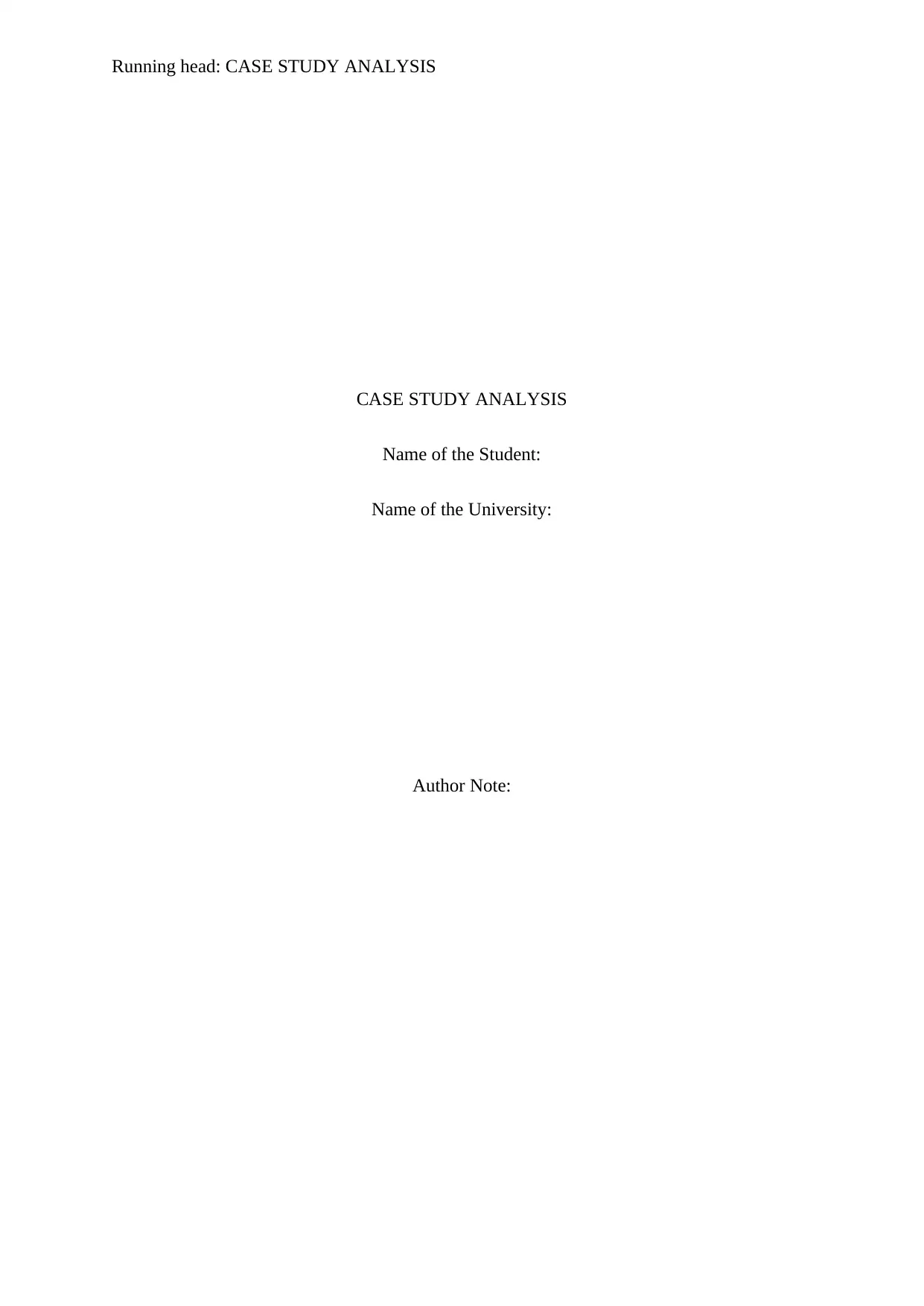
Running head: CASE STUDY ANALYSIS
CASE STUDY ANALYSIS
Name of the Student:
Name of the University:
Author Note:
CASE STUDY ANALYSIS
Name of the Student:
Name of the University:
Author Note:
Secure Best Marks with AI Grader
Need help grading? Try our AI Grader for instant feedback on your assignments.
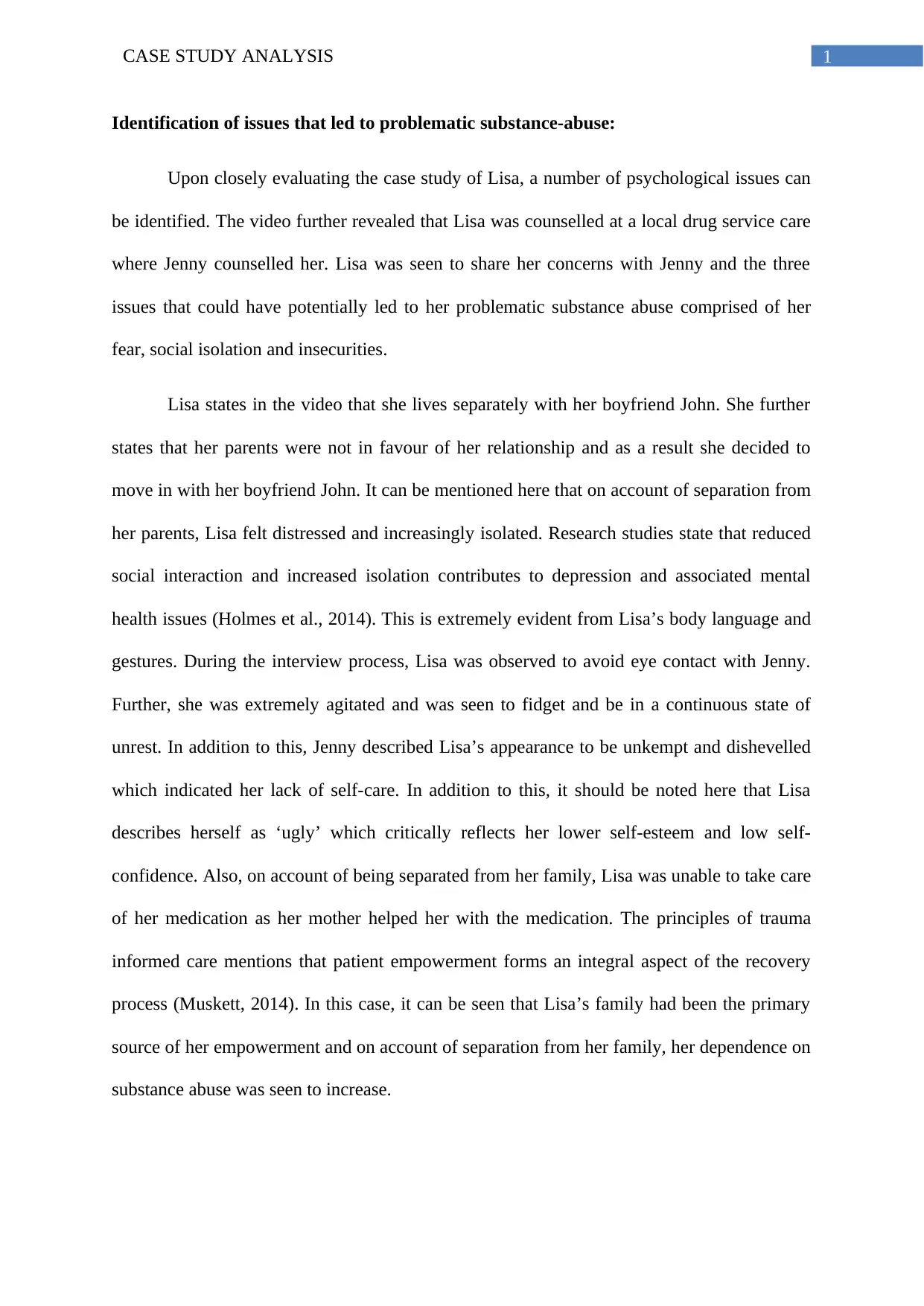
1CASE STUDY ANALYSIS
Identification of issues that led to problematic substance-abuse:
Upon closely evaluating the case study of Lisa, a number of psychological issues can
be identified. The video further revealed that Lisa was counselled at a local drug service care
where Jenny counselled her. Lisa was seen to share her concerns with Jenny and the three
issues that could have potentially led to her problematic substance abuse comprised of her
fear, social isolation and insecurities.
Lisa states in the video that she lives separately with her boyfriend John. She further
states that her parents were not in favour of her relationship and as a result she decided to
move in with her boyfriend John. It can be mentioned here that on account of separation from
her parents, Lisa felt distressed and increasingly isolated. Research studies state that reduced
social interaction and increased isolation contributes to depression and associated mental
health issues (Holmes et al., 2014). This is extremely evident from Lisa’s body language and
gestures. During the interview process, Lisa was observed to avoid eye contact with Jenny.
Further, she was extremely agitated and was seen to fidget and be in a continuous state of
unrest. In addition to this, Jenny described Lisa’s appearance to be unkempt and dishevelled
which indicated her lack of self-care. In addition to this, it should be noted here that Lisa
describes herself as ‘ugly’ which critically reflects her lower self-esteem and low self-
confidence. Also, on account of being separated from her family, Lisa was unable to take care
of her medication as her mother helped her with the medication. The principles of trauma
informed care mentions that patient empowerment forms an integral aspect of the recovery
process (Muskett, 2014). In this case, it can be seen that Lisa’s family had been the primary
source of her empowerment and on account of separation from her family, her dependence on
substance abuse was seen to increase.
Identification of issues that led to problematic substance-abuse:
Upon closely evaluating the case study of Lisa, a number of psychological issues can
be identified. The video further revealed that Lisa was counselled at a local drug service care
where Jenny counselled her. Lisa was seen to share her concerns with Jenny and the three
issues that could have potentially led to her problematic substance abuse comprised of her
fear, social isolation and insecurities.
Lisa states in the video that she lives separately with her boyfriend John. She further
states that her parents were not in favour of her relationship and as a result she decided to
move in with her boyfriend John. It can be mentioned here that on account of separation from
her parents, Lisa felt distressed and increasingly isolated. Research studies state that reduced
social interaction and increased isolation contributes to depression and associated mental
health issues (Holmes et al., 2014). This is extremely evident from Lisa’s body language and
gestures. During the interview process, Lisa was observed to avoid eye contact with Jenny.
Further, she was extremely agitated and was seen to fidget and be in a continuous state of
unrest. In addition to this, Jenny described Lisa’s appearance to be unkempt and dishevelled
which indicated her lack of self-care. In addition to this, it should be noted here that Lisa
describes herself as ‘ugly’ which critically reflects her lower self-esteem and low self-
confidence. Also, on account of being separated from her family, Lisa was unable to take care
of her medication as her mother helped her with the medication. The principles of trauma
informed care mentions that patient empowerment forms an integral aspect of the recovery
process (Muskett, 2014). In this case, it can be seen that Lisa’s family had been the primary
source of her empowerment and on account of separation from her family, her dependence on
substance abuse was seen to increase.
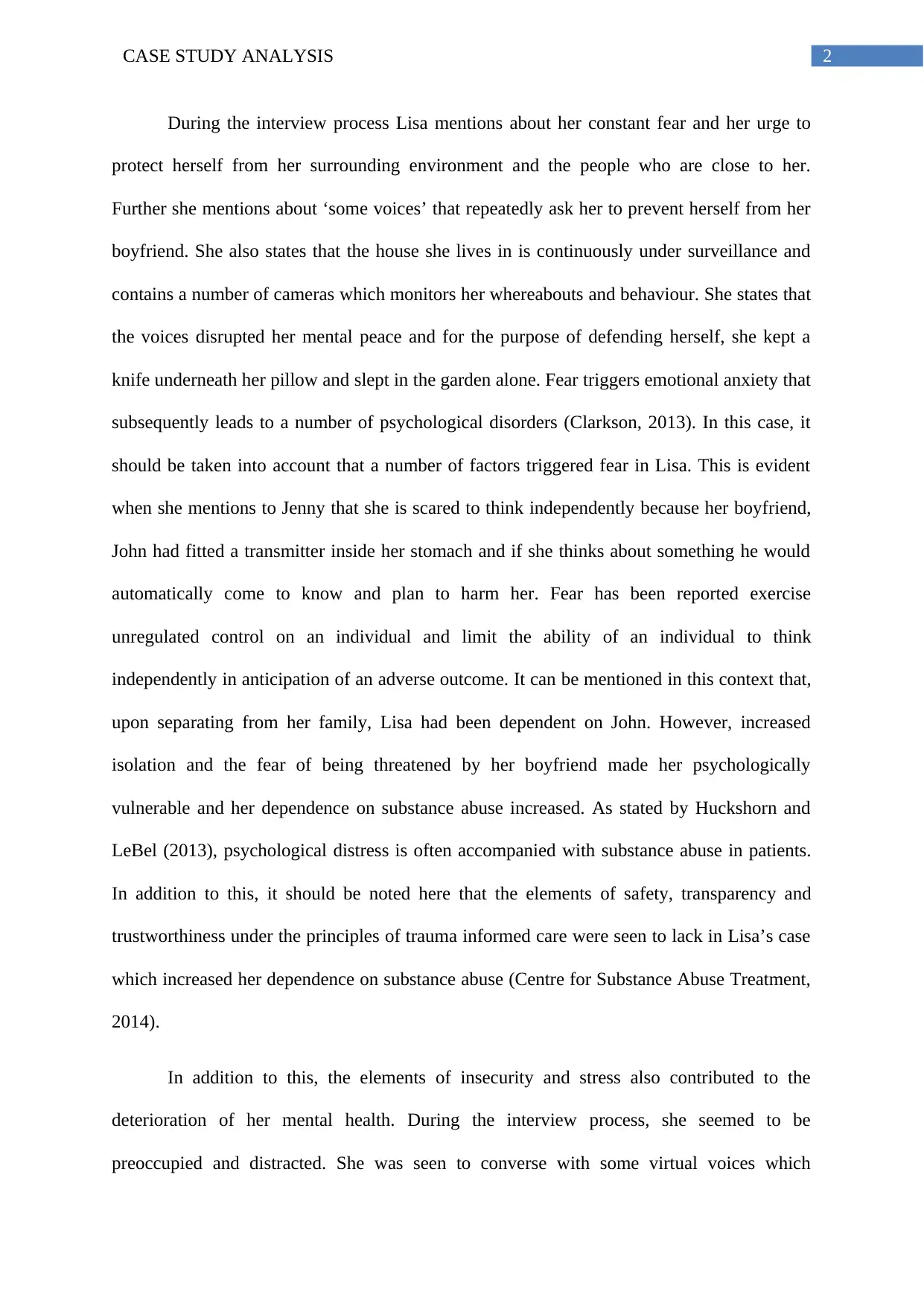
2CASE STUDY ANALYSIS
During the interview process Lisa mentions about her constant fear and her urge to
protect herself from her surrounding environment and the people who are close to her.
Further she mentions about ‘some voices’ that repeatedly ask her to prevent herself from her
boyfriend. She also states that the house she lives in is continuously under surveillance and
contains a number of cameras which monitors her whereabouts and behaviour. She states that
the voices disrupted her mental peace and for the purpose of defending herself, she kept a
knife underneath her pillow and slept in the garden alone. Fear triggers emotional anxiety that
subsequently leads to a number of psychological disorders (Clarkson, 2013). In this case, it
should be taken into account that a number of factors triggered fear in Lisa. This is evident
when she mentions to Jenny that she is scared to think independently because her boyfriend,
John had fitted a transmitter inside her stomach and if she thinks about something he would
automatically come to know and plan to harm her. Fear has been reported exercise
unregulated control on an individual and limit the ability of an individual to think
independently in anticipation of an adverse outcome. It can be mentioned in this context that,
upon separating from her family, Lisa had been dependent on John. However, increased
isolation and the fear of being threatened by her boyfriend made her psychologically
vulnerable and her dependence on substance abuse increased. As stated by Huckshorn and
LeBel (2013), psychological distress is often accompanied with substance abuse in patients.
In addition to this, it should be noted here that the elements of safety, transparency and
trustworthiness under the principles of trauma informed care were seen to lack in Lisa’s case
which increased her dependence on substance abuse (Centre for Substance Abuse Treatment,
2014).
In addition to this, the elements of insecurity and stress also contributed to the
deterioration of her mental health. During the interview process, she seemed to be
preoccupied and distracted. She was seen to converse with some virtual voices which
During the interview process Lisa mentions about her constant fear and her urge to
protect herself from her surrounding environment and the people who are close to her.
Further she mentions about ‘some voices’ that repeatedly ask her to prevent herself from her
boyfriend. She also states that the house she lives in is continuously under surveillance and
contains a number of cameras which monitors her whereabouts and behaviour. She states that
the voices disrupted her mental peace and for the purpose of defending herself, she kept a
knife underneath her pillow and slept in the garden alone. Fear triggers emotional anxiety that
subsequently leads to a number of psychological disorders (Clarkson, 2013). In this case, it
should be taken into account that a number of factors triggered fear in Lisa. This is evident
when she mentions to Jenny that she is scared to think independently because her boyfriend,
John had fitted a transmitter inside her stomach and if she thinks about something he would
automatically come to know and plan to harm her. Fear has been reported exercise
unregulated control on an individual and limit the ability of an individual to think
independently in anticipation of an adverse outcome. It can be mentioned in this context that,
upon separating from her family, Lisa had been dependent on John. However, increased
isolation and the fear of being threatened by her boyfriend made her psychologically
vulnerable and her dependence on substance abuse increased. As stated by Huckshorn and
LeBel (2013), psychological distress is often accompanied with substance abuse in patients.
In addition to this, it should be noted here that the elements of safety, transparency and
trustworthiness under the principles of trauma informed care were seen to lack in Lisa’s case
which increased her dependence on substance abuse (Centre for Substance Abuse Treatment,
2014).
In addition to this, the elements of insecurity and stress also contributed to the
deterioration of her mental health. During the interview process, she seemed to be
preoccupied and distracted. She was seen to converse with some virtual voices which
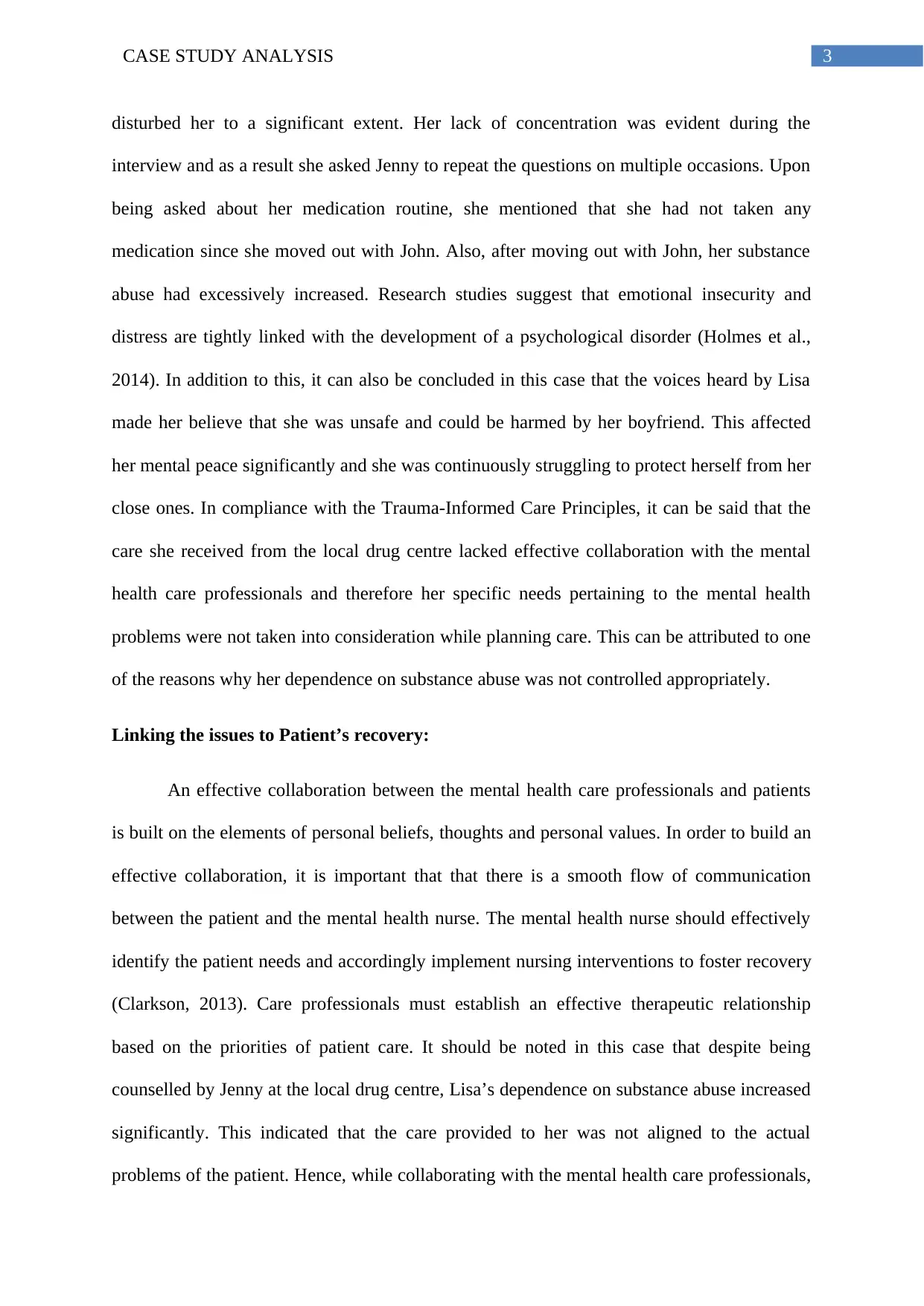
3CASE STUDY ANALYSIS
disturbed her to a significant extent. Her lack of concentration was evident during the
interview and as a result she asked Jenny to repeat the questions on multiple occasions. Upon
being asked about her medication routine, she mentioned that she had not taken any
medication since she moved out with John. Also, after moving out with John, her substance
abuse had excessively increased. Research studies suggest that emotional insecurity and
distress are tightly linked with the development of a psychological disorder (Holmes et al.,
2014). In addition to this, it can also be concluded in this case that the voices heard by Lisa
made her believe that she was unsafe and could be harmed by her boyfriend. This affected
her mental peace significantly and she was continuously struggling to protect herself from her
close ones. In compliance with the Trauma-Informed Care Principles, it can be said that the
care she received from the local drug centre lacked effective collaboration with the mental
health care professionals and therefore her specific needs pertaining to the mental health
problems were not taken into consideration while planning care. This can be attributed to one
of the reasons why her dependence on substance abuse was not controlled appropriately.
Linking the issues to Patient’s recovery:
An effective collaboration between the mental health care professionals and patients
is built on the elements of personal beliefs, thoughts and personal values. In order to build an
effective collaboration, it is important that that there is a smooth flow of communication
between the patient and the mental health nurse. The mental health nurse should effectively
identify the patient needs and accordingly implement nursing interventions to foster recovery
(Clarkson, 2013). Care professionals must establish an effective therapeutic relationship
based on the priorities of patient care. It should be noted in this case that despite being
counselled by Jenny at the local drug centre, Lisa’s dependence on substance abuse increased
significantly. This indicated that the care provided to her was not aligned to the actual
problems of the patient. Hence, while collaborating with the mental health care professionals,
disturbed her to a significant extent. Her lack of concentration was evident during the
interview and as a result she asked Jenny to repeat the questions on multiple occasions. Upon
being asked about her medication routine, she mentioned that she had not taken any
medication since she moved out with John. Also, after moving out with John, her substance
abuse had excessively increased. Research studies suggest that emotional insecurity and
distress are tightly linked with the development of a psychological disorder (Holmes et al.,
2014). In addition to this, it can also be concluded in this case that the voices heard by Lisa
made her believe that she was unsafe and could be harmed by her boyfriend. This affected
her mental peace significantly and she was continuously struggling to protect herself from her
close ones. In compliance with the Trauma-Informed Care Principles, it can be said that the
care she received from the local drug centre lacked effective collaboration with the mental
health care professionals and therefore her specific needs pertaining to the mental health
problems were not taken into consideration while planning care. This can be attributed to one
of the reasons why her dependence on substance abuse was not controlled appropriately.
Linking the issues to Patient’s recovery:
An effective collaboration between the mental health care professionals and patients
is built on the elements of personal beliefs, thoughts and personal values. In order to build an
effective collaboration, it is important that that there is a smooth flow of communication
between the patient and the mental health nurse. The mental health nurse should effectively
identify the patient needs and accordingly implement nursing interventions to foster recovery
(Clarkson, 2013). Care professionals must establish an effective therapeutic relationship
based on the priorities of patient care. It should be noted in this case that despite being
counselled by Jenny at the local drug centre, Lisa’s dependence on substance abuse increased
significantly. This indicated that the care provided to her was not aligned to the actual
problems of the patient. Hence, while collaborating with the mental health care professionals,
Secure Best Marks with AI Grader
Need help grading? Try our AI Grader for instant feedback on your assignments.
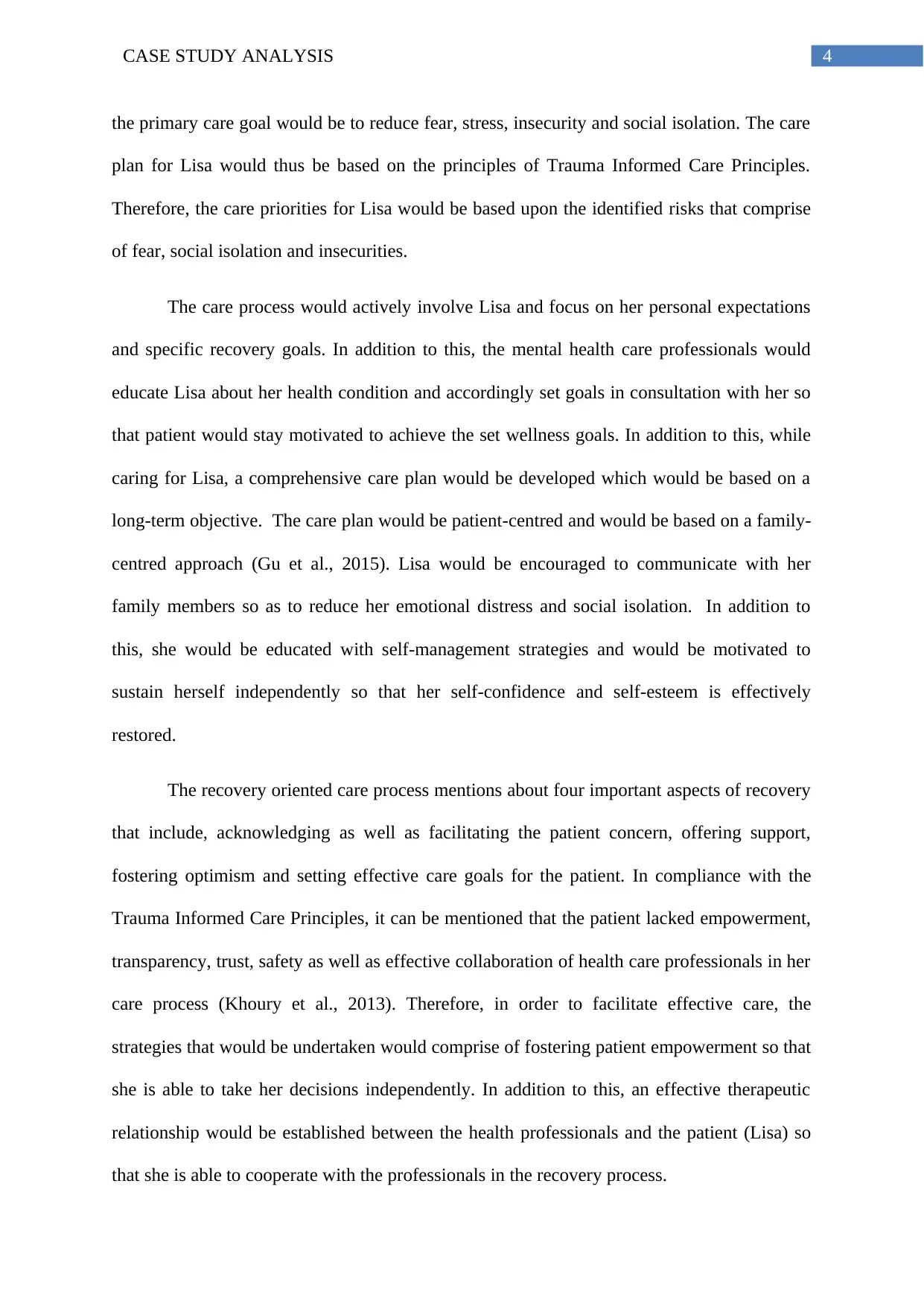
4CASE STUDY ANALYSIS
the primary care goal would be to reduce fear, stress, insecurity and social isolation. The care
plan for Lisa would thus be based on the principles of Trauma Informed Care Principles.
Therefore, the care priorities for Lisa would be based upon the identified risks that comprise
of fear, social isolation and insecurities.
The care process would actively involve Lisa and focus on her personal expectations
and specific recovery goals. In addition to this, the mental health care professionals would
educate Lisa about her health condition and accordingly set goals in consultation with her so
that patient would stay motivated to achieve the set wellness goals. In addition to this, while
caring for Lisa, a comprehensive care plan would be developed which would be based on a
long-term objective. The care plan would be patient-centred and would be based on a family-
centred approach (Gu et al., 2015). Lisa would be encouraged to communicate with her
family members so as to reduce her emotional distress and social isolation. In addition to
this, she would be educated with self-management strategies and would be motivated to
sustain herself independently so that her self-confidence and self-esteem is effectively
restored.
The recovery oriented care process mentions about four important aspects of recovery
that include, acknowledging as well as facilitating the patient concern, offering support,
fostering optimism and setting effective care goals for the patient. In compliance with the
Trauma Informed Care Principles, it can be mentioned that the patient lacked empowerment,
transparency, trust, safety as well as effective collaboration of health care professionals in her
care process (Khoury et al., 2013). Therefore, in order to facilitate effective care, the
strategies that would be undertaken would comprise of fostering patient empowerment so that
she is able to take her decisions independently. In addition to this, an effective therapeutic
relationship would be established between the health professionals and the patient (Lisa) so
that she is able to cooperate with the professionals in the recovery process.
the primary care goal would be to reduce fear, stress, insecurity and social isolation. The care
plan for Lisa would thus be based on the principles of Trauma Informed Care Principles.
Therefore, the care priorities for Lisa would be based upon the identified risks that comprise
of fear, social isolation and insecurities.
The care process would actively involve Lisa and focus on her personal expectations
and specific recovery goals. In addition to this, the mental health care professionals would
educate Lisa about her health condition and accordingly set goals in consultation with her so
that patient would stay motivated to achieve the set wellness goals. In addition to this, while
caring for Lisa, a comprehensive care plan would be developed which would be based on a
long-term objective. The care plan would be patient-centred and would be based on a family-
centred approach (Gu et al., 2015). Lisa would be encouraged to communicate with her
family members so as to reduce her emotional distress and social isolation. In addition to
this, she would be educated with self-management strategies and would be motivated to
sustain herself independently so that her self-confidence and self-esteem is effectively
restored.
The recovery oriented care process mentions about four important aspects of recovery
that include, acknowledging as well as facilitating the patient concern, offering support,
fostering optimism and setting effective care goals for the patient. In compliance with the
Trauma Informed Care Principles, it can be mentioned that the patient lacked empowerment,
transparency, trust, safety as well as effective collaboration of health care professionals in her
care process (Khoury et al., 2013). Therefore, in order to facilitate effective care, the
strategies that would be undertaken would comprise of fostering patient empowerment so that
she is able to take her decisions independently. In addition to this, an effective therapeutic
relationship would be established between the health professionals and the patient (Lisa) so
that she is able to cooperate with the professionals in the recovery process.
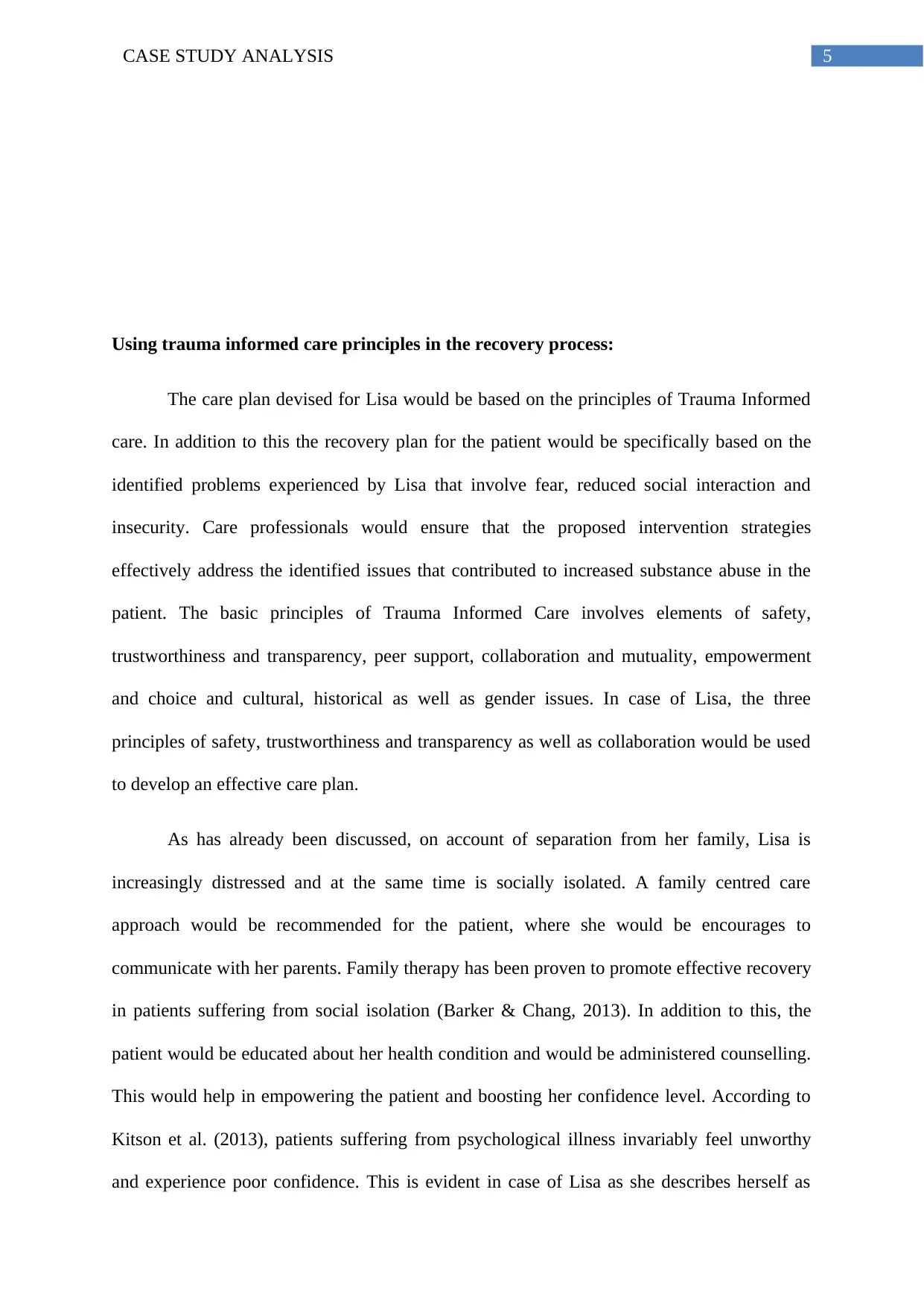
5CASE STUDY ANALYSIS
Using trauma informed care principles in the recovery process:
The care plan devised for Lisa would be based on the principles of Trauma Informed
care. In addition to this the recovery plan for the patient would be specifically based on the
identified problems experienced by Lisa that involve fear, reduced social interaction and
insecurity. Care professionals would ensure that the proposed intervention strategies
effectively address the identified issues that contributed to increased substance abuse in the
patient. The basic principles of Trauma Informed Care involves elements of safety,
trustworthiness and transparency, peer support, collaboration and mutuality, empowerment
and choice and cultural, historical as well as gender issues. In case of Lisa, the three
principles of safety, trustworthiness and transparency as well as collaboration would be used
to develop an effective care plan.
As has already been discussed, on account of separation from her family, Lisa is
increasingly distressed and at the same time is socially isolated. A family centred care
approach would be recommended for the patient, where she would be encourages to
communicate with her parents. Family therapy has been proven to promote effective recovery
in patients suffering from social isolation (Barker & Chang, 2013). In addition to this, the
patient would be educated about her health condition and would be administered counselling.
This would help in empowering the patient and boosting her confidence level. According to
Kitson et al. (2013), patients suffering from psychological illness invariably feel unworthy
and experience poor confidence. This is evident in case of Lisa as she describes herself as
Using trauma informed care principles in the recovery process:
The care plan devised for Lisa would be based on the principles of Trauma Informed
care. In addition to this the recovery plan for the patient would be specifically based on the
identified problems experienced by Lisa that involve fear, reduced social interaction and
insecurity. Care professionals would ensure that the proposed intervention strategies
effectively address the identified issues that contributed to increased substance abuse in the
patient. The basic principles of Trauma Informed Care involves elements of safety,
trustworthiness and transparency, peer support, collaboration and mutuality, empowerment
and choice and cultural, historical as well as gender issues. In case of Lisa, the three
principles of safety, trustworthiness and transparency as well as collaboration would be used
to develop an effective care plan.
As has already been discussed, on account of separation from her family, Lisa is
increasingly distressed and at the same time is socially isolated. A family centred care
approach would be recommended for the patient, where she would be encourages to
communicate with her parents. Family therapy has been proven to promote effective recovery
in patients suffering from social isolation (Barker & Chang, 2013). In addition to this, the
patient would be educated about her health condition and would be administered counselling.
This would help in empowering the patient and boosting her confidence level. According to
Kitson et al. (2013), patients suffering from psychological illness invariably feel unworthy
and experience poor confidence. This is evident in case of Lisa as she describes herself as
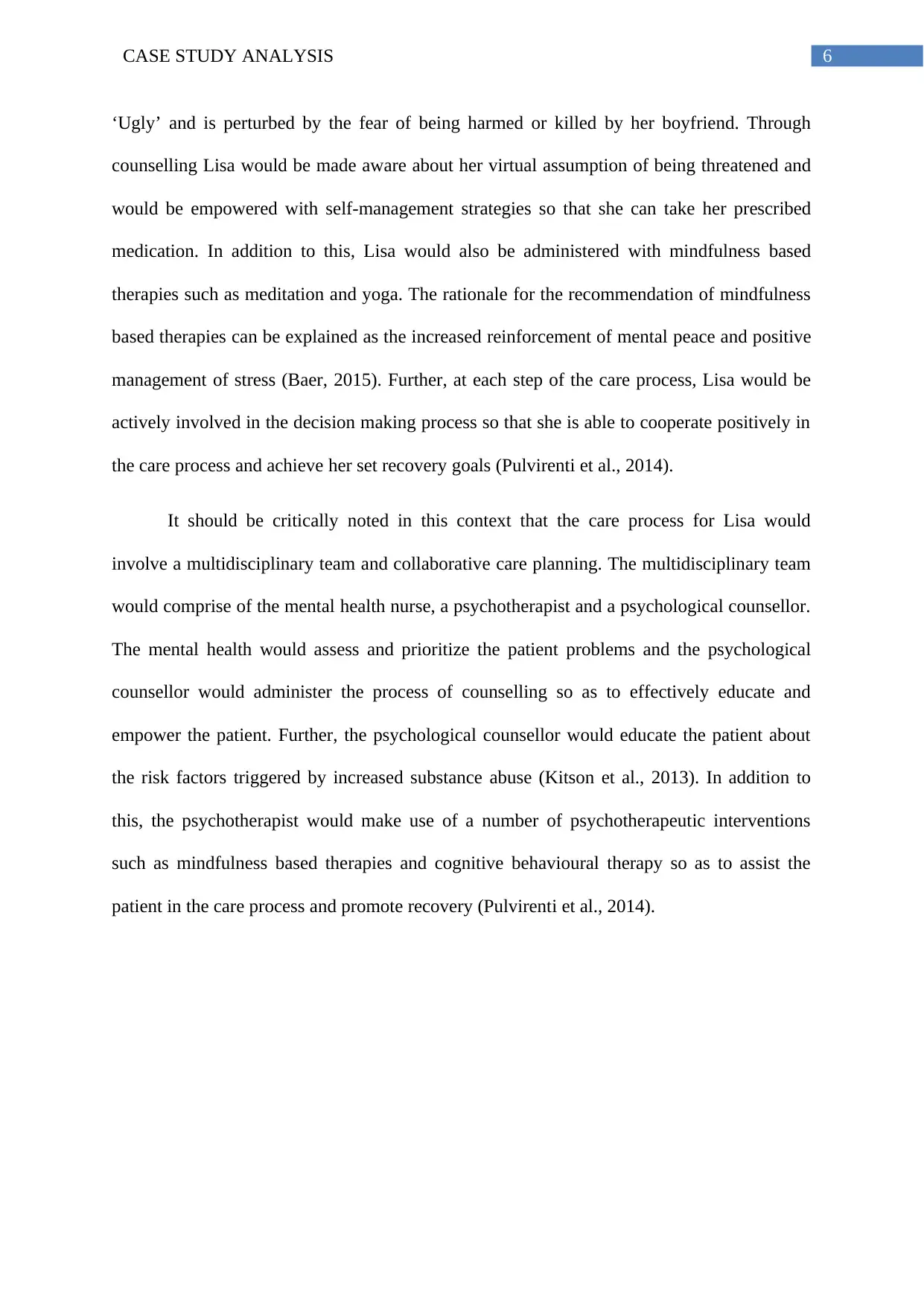
6CASE STUDY ANALYSIS
‘Ugly’ and is perturbed by the fear of being harmed or killed by her boyfriend. Through
counselling Lisa would be made aware about her virtual assumption of being threatened and
would be empowered with self-management strategies so that she can take her prescribed
medication. In addition to this, Lisa would also be administered with mindfulness based
therapies such as meditation and yoga. The rationale for the recommendation of mindfulness
based therapies can be explained as the increased reinforcement of mental peace and positive
management of stress (Baer, 2015). Further, at each step of the care process, Lisa would be
actively involved in the decision making process so that she is able to cooperate positively in
the care process and achieve her set recovery goals (Pulvirenti et al., 2014).
It should be critically noted in this context that the care process for Lisa would
involve a multidisciplinary team and collaborative care planning. The multidisciplinary team
would comprise of the mental health nurse, a psychotherapist and a psychological counsellor.
The mental health would assess and prioritize the patient problems and the psychological
counsellor would administer the process of counselling so as to effectively educate and
empower the patient. Further, the psychological counsellor would educate the patient about
the risk factors triggered by increased substance abuse (Kitson et al., 2013). In addition to
this, the psychotherapist would make use of a number of psychotherapeutic interventions
such as mindfulness based therapies and cognitive behavioural therapy so as to assist the
patient in the care process and promote recovery (Pulvirenti et al., 2014).
‘Ugly’ and is perturbed by the fear of being harmed or killed by her boyfriend. Through
counselling Lisa would be made aware about her virtual assumption of being threatened and
would be empowered with self-management strategies so that she can take her prescribed
medication. In addition to this, Lisa would also be administered with mindfulness based
therapies such as meditation and yoga. The rationale for the recommendation of mindfulness
based therapies can be explained as the increased reinforcement of mental peace and positive
management of stress (Baer, 2015). Further, at each step of the care process, Lisa would be
actively involved in the decision making process so that she is able to cooperate positively in
the care process and achieve her set recovery goals (Pulvirenti et al., 2014).
It should be critically noted in this context that the care process for Lisa would
involve a multidisciplinary team and collaborative care planning. The multidisciplinary team
would comprise of the mental health nurse, a psychotherapist and a psychological counsellor.
The mental health would assess and prioritize the patient problems and the psychological
counsellor would administer the process of counselling so as to effectively educate and
empower the patient. Further, the psychological counsellor would educate the patient about
the risk factors triggered by increased substance abuse (Kitson et al., 2013). In addition to
this, the psychotherapist would make use of a number of psychotherapeutic interventions
such as mindfulness based therapies and cognitive behavioural therapy so as to assist the
patient in the care process and promote recovery (Pulvirenti et al., 2014).
Paraphrase This Document
Need a fresh take? Get an instant paraphrase of this document with our AI Paraphraser
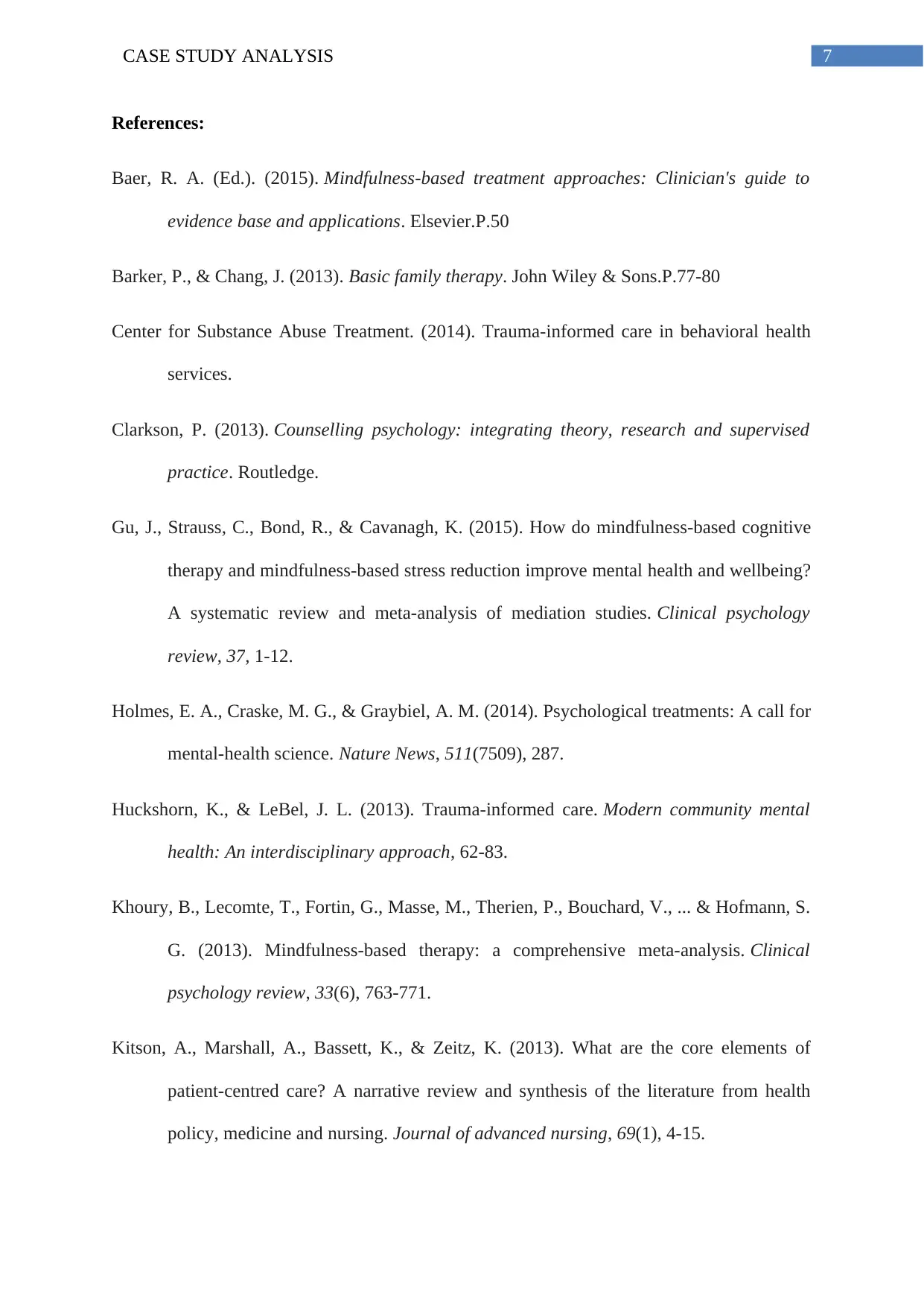
7CASE STUDY ANALYSIS
References:
Baer, R. A. (Ed.). (2015). Mindfulness-based treatment approaches: Clinician's guide to
evidence base and applications. Elsevier.P.50
Barker, P., & Chang, J. (2013). Basic family therapy. John Wiley & Sons.P.77-80
Center for Substance Abuse Treatment. (2014). Trauma-informed care in behavioral health
services.
Clarkson, P. (2013). Counselling psychology: integrating theory, research and supervised
practice. Routledge.
Gu, J., Strauss, C., Bond, R., & Cavanagh, K. (2015). How do mindfulness-based cognitive
therapy and mindfulness-based stress reduction improve mental health and wellbeing?
A systematic review and meta-analysis of mediation studies. Clinical psychology
review, 37, 1-12.
Holmes, E. A., Craske, M. G., & Graybiel, A. M. (2014). Psychological treatments: A call for
mental-health science. Nature News, 511(7509), 287.
Huckshorn, K., & LeBel, J. L. (2013). Trauma-informed care. Modern community mental
health: An interdisciplinary approach, 62-83.
Khoury, B., Lecomte, T., Fortin, G., Masse, M., Therien, P., Bouchard, V., ... & Hofmann, S.
G. (2013). Mindfulness-based therapy: a comprehensive meta-analysis. Clinical
psychology review, 33(6), 763-771.
Kitson, A., Marshall, A., Bassett, K., & Zeitz, K. (2013). What are the core elements of
patient‐centred care? A narrative review and synthesis of the literature from health
policy, medicine and nursing. Journal of advanced nursing, 69(1), 4-15.
References:
Baer, R. A. (Ed.). (2015). Mindfulness-based treatment approaches: Clinician's guide to
evidence base and applications. Elsevier.P.50
Barker, P., & Chang, J. (2013). Basic family therapy. John Wiley & Sons.P.77-80
Center for Substance Abuse Treatment. (2014). Trauma-informed care in behavioral health
services.
Clarkson, P. (2013). Counselling psychology: integrating theory, research and supervised
practice. Routledge.
Gu, J., Strauss, C., Bond, R., & Cavanagh, K. (2015). How do mindfulness-based cognitive
therapy and mindfulness-based stress reduction improve mental health and wellbeing?
A systematic review and meta-analysis of mediation studies. Clinical psychology
review, 37, 1-12.
Holmes, E. A., Craske, M. G., & Graybiel, A. M. (2014). Psychological treatments: A call for
mental-health science. Nature News, 511(7509), 287.
Huckshorn, K., & LeBel, J. L. (2013). Trauma-informed care. Modern community mental
health: An interdisciplinary approach, 62-83.
Khoury, B., Lecomte, T., Fortin, G., Masse, M., Therien, P., Bouchard, V., ... & Hofmann, S.
G. (2013). Mindfulness-based therapy: a comprehensive meta-analysis. Clinical
psychology review, 33(6), 763-771.
Kitson, A., Marshall, A., Bassett, K., & Zeitz, K. (2013). What are the core elements of
patient‐centred care? A narrative review and synthesis of the literature from health
policy, medicine and nursing. Journal of advanced nursing, 69(1), 4-15.

8CASE STUDY ANALYSIS
Muskett, C. (2014). Trauma‐informed care in inpatient mental health settings: A review of
the literature. International journal of mental health nursing, 23(1), 51-59.
Pulvirenti, M., McMillan, J., & Lawn, S. (2014). Empowerment, patient centred care and
self‐management. Health Expectations, 17(3), 303-310.
Muskett, C. (2014). Trauma‐informed care in inpatient mental health settings: A review of
the literature. International journal of mental health nursing, 23(1), 51-59.
Pulvirenti, M., McMillan, J., & Lawn, S. (2014). Empowerment, patient centred care and
self‐management. Health Expectations, 17(3), 303-310.
1 out of 9
Related Documents
Your All-in-One AI-Powered Toolkit for Academic Success.
+13062052269
info@desklib.com
Available 24*7 on WhatsApp / Email
![[object Object]](/_next/static/media/star-bottom.7253800d.svg)
Unlock your academic potential
© 2024 | Zucol Services PVT LTD | All rights reserved.





